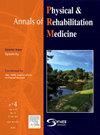测量发育性协调障碍儿童活动和参与的仪器质量:系统回顾。
IF 4.6
3区 医学
Q1 REHABILITATION
Annals of Physical and Rehabilitation Medicine
Pub Date : 2025-02-01
DOI:10.1016/j.rehab.2024.101889
引用次数: 0
摘要
目的确定评估发育协调障碍(DCD)儿童活动和参与的工具,并分析其测量特性的质量和现有证据水平:2023年1月,我们在PubMed/MEDLINE、Scopus、Web of Science、Embase、中国生物医学数据库、万方数据库和中国国家知识基础设施上进行了全面检索,以确定用于评估DCD儿童活动和参与的工具的心理测量研究。在筛选过程中,两名独立审稿人使用基于共识的健康状况测量工具选择标准(COSMIN)核对表对每种工具的质量和证据水平进行了评估:检索结果显示,共有 4221 篇参考文献,其中包括 96 项研究和 28 份标准化临床测试或问卷。根据 COSMIN 标准,大多数工具在测量特性方面的评级为充分(68%)或不确定(20%)。根据 "建议评估、开发和评价分级"(Grading of Recommendations Assessment, Development, and Evaluation),证据质量主要为高(59%)或中等(12%)。运动评估电池-第二版》被推荐用于评估运动活动(标准 A),其依据是中度至高质量的证据,显示大多数测量特性的评分令人满意。发育协调障碍问卷-修订版及其 Little 扩展版被推荐用于提供有关日常活动限制的信息(标准 B),其测量特性得到了中度至高质量证据的充分支持。标准化临床测试 DCDDaily、Körperkoordinationstest für Kinder、Performance Fitness Battery 以及 DCDDaily 问卷和教师运动观察问卷的评分和证据均可接受,但存在局限性,需要进一步研究。其余的标准化测试和问卷需要更多的证据:结论:已确定了各种评估量表,并根据其测量特性和证据质量绘制了临床决策图。临床决策图提供了易于理解的信息,有助于选择循证工具,用于 DCD 儿童的研究和临床实践:本综述方案已在 PROSPERO(CRD42022327251)上注册。本文章由计算机程序翻译,如有差异,请以英文原文为准。
Quality of instruments measuring activity and participation in children with developmental coordination disorder: A systematic review
Objectives
To identify instruments assessing the activity and participation of children with developmental coordination disorder (DCD) and analyze the quality and current level of evidence regarding their measurement properties.
Methods
A comprehensive search was conducted in January 2023 on PubMed/MEDLINE, Scopus, Web of Science, Embase, Chinese Biomedical Databases, Wanfang and China National Knowledge Infrastructure to identify psychometric studies of instruments used to assess activity and participation in children with DCD. The selection process involved 2 independent reviewers who assessed the quality and level of evidence for each instrument using the COnsensus-based Standards for the selection of health status Measurement INstruments (COSMIN) checklist.
Results
The search yielded 4221 references, of which 96 studies with 28 standardized clinical tests or questionnaires were included. According to the COSMIN criteria, most instruments had sufficient (68 %) or indeterminate (20 %) ratings in terms of their measurement properties. The quality of evidence was mainly high (59 %) or moderate (12 %), as per the Grading of Recommendations Assessment, Development, and Evaluation. The Movement Assessment Battery-second Edition was recommended for assessing motor activities (criterion A) based on moderate- to high-quality evidence showing satisfactory ratings for most measurement properties. The Developmental Coordination Disorder Questionnaire-Revised and its Little extension were recommended to provide information on daily activity limitations (criterion B) supported by sufficient measurement properties with moderate- to high-quality evidence. The standardized clinical tests DCDDaily, Körperkoordinationstest für Kinder, Performance Fitness Battery, and the DCDDaily-Questionnaire and Motor Observation Questionnaire for Teachers received acceptable ratings and evidence but had limitations requiring further investigation. More evidence was required for the remaining standardized tests and questionnaires.
Conclusion
Various assessment scales have been identified and a clinical decision map has been developed based on their measurement properties and quality of evidence. The clinical decision map provides easily understandable information that helps in selecting evidence-based instruments for research and clinical practice in children with DCD.
Registration
The protocol of this review was registered on PROSPERO (CRD42022327251).
求助全文
通过发布文献求助,成功后即可免费获取论文全文。
去求助
来源期刊

Annals of Physical and Rehabilitation Medicine
Medicine-Rehabilitation
CiteScore
7.80
自引率
4.30%
发文量
136
审稿时长
34 days
期刊介绍:
Annals of Physical and Rehabilitation Medicine covers all areas of Rehabilitation and Physical Medicine; such as: methods of evaluation of motor, sensory, cognitive and visceral impairments; acute and chronic musculoskeletal disorders and pain; disabilities in adult and children ; processes of rehabilitation in orthopaedic, rhumatological, neurological, cardiovascular, pulmonary and urological diseases.
 求助内容:
求助内容: 应助结果提醒方式:
应助结果提醒方式:


